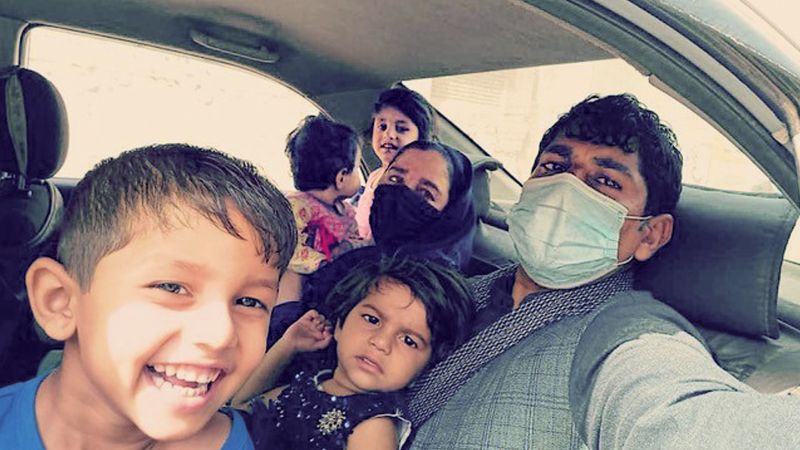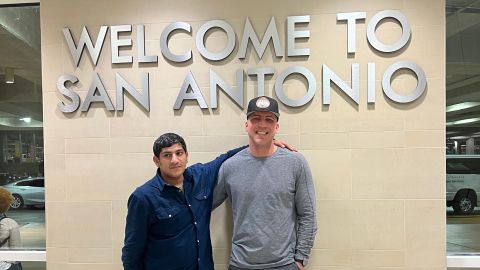
CNN
—
It was November 2010 and a platoon of Marines was patrolling outside of a village in Helmand Province, Afghanistan – slowly, and carefully, to avoid accidentally stepping on hidden improvised explosive devices. They walked in a single file line meant to reduce the risk of multiple Marines being taken out in one blast.
In the patrol formation was Zainullah Zaki, a young Afghan man working as an interpreter with 3rd Battalion, 5th Marine Regiment, 1st Marine Division. As the Marines scanned for hidden explosives, Zaki, known as Zak by his American counterparts, listened to the radio, monitoring frequencies for Taliban communications.
As they walked, he heard a Taliban commander coordinating an ambush on the very Marines he was with.
Maj. Tom Schueman, the platoon commander at the time, told CNN that Zaki told him what was happening and said the Marines needed to “hurry up” to get into town. He recalled telling Zaki that they could only move as fast as the Marines at the front of the column, but Zaki insisted they move faster to avoid being caught in an attack.
“Zak said, ‘That’s not fast enough,’” Schueman recalled, “And he just took off, ran a couple hundred meters through this active IED belt, mine field. He was able to correlate where the guy was observing us from, he knew what building the guy was in and went in there, tackled him, and detained him.”
It wasn’t the last time Zaki would go far outside his job description to help the Marines he served alongside. But despite the deep trust and camaraderie Zaki formed with the Marines and his employment by US contractors for more than two years in Afghanistan, he recently received notice that his request for a Special Immigrant Visa was denied for the last time. Zaki and his family are now in uncertain territory alongside thousands of other Afghans who were evacuated from the country, as the humanitarian parole status they resettled in the US with is set to expire next year.
A notice from the chief of mission for the US Embassy in Kabul dated November 30 said that Zaki’s request for the visa, which is meant to provide a pathway to the United States for Afghans who were employed by or worked on behalf of the US government, was denied due to an insufficient length of employment.
“There is no further appeal of this decision,” the letter says. The denial was first reported by military news outlet Task & Purpose.
Schueman said he doesn’t understand the problem: Zaki was employed by US contractors for more than a year, which is the required length of time to receive a SIV. Indeed, a letter of verification provided to CNN and signed by the chief operating officer of IAP Worldwide Services shows that he worked as a linguist in Kunar Province from January 2012 to December 2013 – just short of two years. Another verification letter showed he was employed by Mission Essential, another US contractor, from September 2010 to July 2011.
However, the denial letter says that his verification letter from IAP is not valid. Pete Lucier, a Marine veteran who works with #AfghanEvac, a non-profit focused on “fulfilling the United States’ duty to Afghan allies,” said the problem likely lies with one sentence in the verification letter. The letter states that while Zaki “was not employed directly by my company, IAP Worldwide Services, Inc., he was assigned to me by our local [US Government] management.”
“Reading denials is a bit like parsing a secret code, but they seem to be saying that since Zaki didn’t work for IAP, an IAP employee can’t confirm employment by a third company,” Lucier said.
He added that the frustration over the paperwork is “absolutely valid. Everything that they provided should be more than enough, you shouldn’t have to dig up old records from these companies, and it’s pretty clear from what they assembled that this guy should probably be given the benefit of the doubt.”
But that doesn’t seem to be the case, and Zaki told CNN that verification letter was all he had from his second stint of employment with US contractors. Today, he’s unsure of know how to get in touch with the US organization who’d employed him in order to request more paperwork.
Rob Hargis, the chief operating officer of IAP who signed Zaki’s August 2021 verification letter, told CNN that Zaki was “employed by another company that worked on bases where we also worked,” and was “often on small tasks where one of our staff oversaw” him. Hargis said he was “disappointed” to hear that Zaki’s SIV had been denied and called the SIV process as a whole “hugely frustrating.”
“To hear that Zaki’s case is denied is yet another example of an inflexible process where flexibility and judgement should be considered in each adjudication,” Hargis said. “From where we and many of our peers in the Defense Contracting Community sit, it is profoundly disappointing to see our former and faithful interpreters and other Afghan support staff languish in a process that is neither transparent, nor efficient.”

Throughout his journey to the US and process to get his SIV after arriving, Zaki’s situation has drawn attention from lawmakers who are advocating behind the scenes to help him, as he and his family – a wife and five children, one of whom was born in Texas, where they live – face an uncertain future.
The office of North Carolina Republican Rep. Ted Budd, who recently won a seat in the Senate, is “in contact with [Zainullah Zaki]” and “trying to successfully resolve his case,” Budd’s spokesman Curtis Kalin told CNN.
Sen. Dick Durbin, an Illinois Democrat, has also advocated for Zaki to receive a visa and for the passage of the Afghan Adjustment Act, which would provide a pathway to lawful permanent residency to Afghans who were evacuated to the US. But the legislation ultimately wasn’t included in the massive spending bill recently passed by Congress.
“For 20 years, thousands of Afghans risked their lives to stand alongside our service members and diplomats during America’s longest war,” Durbin, who’s the chair of the Senate Judiciary Committee, said in a statement to CNN. “We must now honor our commitment to them and provide a pathway to safety and certainty in the U.S. … Zaki and his family, and thousands of others, deserve no less, and I will continue to do what I can to help advocate for them.”
The State Department declined to comment, citing visa records’ confidentiality.
Despite the nuances and inner challenges of the SIV process, it’s all rather simple to Schueman. Zaki’s willingness to confront the Taliban in order to save the Marines on patrol, Schueman said, was “just one of many events where Zak demonstrated that he was willing to die for us.” That alone, he said, should be enough for him to receive support from the US.
Travis Haggerty, who served in Schueman’s platoon and has since left service, said Zaki is the reason more of his fellow Marines weren’t killed or severely wounded on that deployment. He served as a “radar” of sorts, Haggerty said, helping them assess what was abnormal or dangerous in a country and culture they were unfamiliar with.
And it didn’t stop there. Both Schueman and Haggerty said Zaki repeatedly went above and beyond his role as an interpreter.
“If we were having to carry a casualty to a helicopter or to a safe place, Zak had no problem jumping on the stretcher and carrying a corner of that stretcher. He had no problem running with you towards someone who had just gotten blown up or shot, trying to see what he could do to make everyone safe,” Haggerty said. “He was just a constant … He stayed with us and was actively involved, because he thought we were family, and we thought he was family.”
When Schueman met Zaki in 2010, the interpreter was roughly the same age as the young Marines he was working alongside. Schueman recalled that Zaki began working with them after others had quit; it was “too dangerous,” the Marine officer said.
They had good reason to feel that way. The 3/5 Marines, nicknamed the “Darkhorse” battalion, lost 25 Marines during their deployment to Sangin, Afghanistan, one of the deadliest places for US and British forces in the country. Roughly 200 more were wounded. But the Marines said Zaki never balked.
Zaki told CNN that he wanted to work with the US to “build a brighter Afghanistan.”
That drive and passion for what he was doing was evident to the Marines who served with him.
“From the minute we hit Afghanistan, we were told we were going into a really bad spot,” Trey Humphrey, another Marine who worked alongside Zaki, said. “Zak got assigned, and he was a pretty hard charger, I mean he was excited and eager to help … We went through some pretty f**ked up stuff, and a lot of guys got hurt or wounded or injured or killed, and I don’t know why the f**k Zak would want to do that job. There’s no way we paid him enough to do it.”
Some of the Marines lost touch with Zaki after the deployment, but Schueman said he stayed in touch with his interpreter through Facebook. And in 2016, Zaki sent him a message telling him that persecution in Afghanistan was “increasing,” and he’d decided to apply for a SIV.
“I think that was pretty tough for him in a lot of ways, because Zak joined with the US, allied with the US, essentially to have a more prosperous Afghanistan that he wanted to invest in, that he wanted to raise his family in, that he believed in,” Schueman said. “So, for him to make that decision to leave only came after like, significant duress, significant persecution … almost nightly death threats to his home.”
Schueman agreed to help him, though he said neither of them knew much about the SIV process other than that it existed. In theory, he said, it’s “not complicated”– you serve a required amount of time with the US military, and you get a visa. Zaki had served roughly nine months with his Marines, and almost two years with another US contractor.
“I thought it was pretty clear cut,” Schueman said, “but it did not end up turning out that way.”
Like so many others who applied for a SIV, the process turned out much more laborious than they’d anticipated. For six years now the two have chipped away. Schueman said in all that time, there has “never been a person who has corresponded with us.” Instead, they get “an anonymous, kind of sanitized email” with a scripted response.
That impersonal process is part of the problem, according to Lucier. Like Zaki’s letter of denial shows, applicants are often not given specific reasons as to why their paperwork is being rejected, or what in particular they need to fix, he said.
The unit that reviews SIV approval “could have had a conversation here,” he said. “They could have followed up with the letter writer, requested an explanation, or more evidence,” Lucier said, highlighting that the process’ many requirements are “really difficult for anyone to navigate, but especially for non-Native English speakers, which more applicants are.”
Zaki had all but given up by the time the US and its allies began pulling their forces out of Afghanistan last year. Schueman said he spoke with Zaki after it was announced in April 2021 that the US was leaving: “I asked Zak, I said, ‘What are the implications of that for you?’ He said, ‘That means my family and I will be killed.’”
What followed was months of advocacy from Schueman, including media interviews and calls and meetings with lawmakers. Like so many other veterans of Afghanistan, Schueman was in a mad dash to get his former interpreter out of danger, though there was little direction on how exactly the US government was going to help. So, he took it upon himself. Schueman said he spoke a number of times with a friend who deployed to Kabul during the evacuation, helping connect the two in order to get Zaki and his family out.
Eventually they did. Schueman said they first went to Qatar, then Germany, and finally landed in Philadelphia. From there, they went to Virginia, Minnesota, and eventually down to San Antonio, Texas, to be near family in the area.

“From there, he started working construction,” Schueman said. “He got a one-bedroom apartment. We started writing a book together. I mean, he was happy. He was safe. They’ve got a great Muslim community down there … He’s really been embracing setting into his new American life.”
That safety, however, once again seemed to be put in jeopardy on November 30, when Zaki received notice that his request for an SIV was rejected.
Schueman called the letter “devastating,” and thought it was particularly difficult to understand given all the media attention that had been on Zaki’s case.
“It’s something we’ve been working towards for six years,” Schueman said, “something that the documentation so clearly demonstrated that he earned and with no explanation, just, ‘You may not appeal. This is your final determination; you may not appeal.’”
Lucier told CNN that due to a recent change in law, there may still be potential for an appeal, despite the letter’s assertion. But Zaki’s troubles are indicative of much broader flaws within the SIV program, Lucier said, that leave people with “confounding, confusing denials” and stuck in a “nightmare of bureaucracy.”
It’s understandable that there’s a process, and that the process is imperfect, Humphrey said. But it’s hard not to take it personally when he and his fellow Marines saw day in and day out what Zaki did for them. There’s not “a single person more deserving of being pushed through this process,” he said, and in a perfect world, those behind the SIV process would be able to see the person and the story behind the paperwork.
Zaki is not the only Afghan evacuee in limbo after escaping the Taliban’s rule last year. Roughly 83,000 people – including Afghan nationals, lawful permanent residents, and American citizens – came to the US as part of Operation Allies Welcome. But as evacuated Afghans near the two-year expiration date of their temporary status, advocates have pushed for Congress to take action in helping them secure a pathway to lawful permanent residency.
Although the legislation attempting to solidify that pathway was not included in the massive spending bill voted on last week, lawmakers did include legislation to extend and expand the SIV program for Afghans who worked with the US.
Zaki, Haggerty said, “genuinely wants the American dream for his kids.”
“He’ll make a really incredible American citizen when that day comes,” Haggerty said. “And it should come sooner rather than later.”
